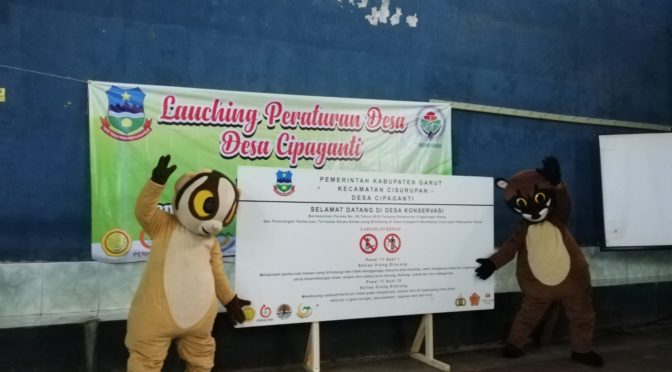As Christmas is approaching, we have celebrated the best Christmas present ever for slow lorises: the launch of the hunting and littering ban! Cipaganti community decided this year to implement a law to ban hunting activities and littering, and that is a huge achievement after years of conservation efforts in the area. That was a long journey to achieve this result, and our field team and the Cipaganti community deserved a huge celebration!
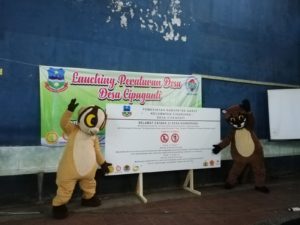
When I arrived at Cipaganti in January 2019, I would have never expected to achieve this result. Actually, I did not even think about this as a possibility, it was too big even to think about. The idea of a local law banning hunting activities started growing in our minds in March 2019 when we had a series of meetings with the local farmers to agree on common strategies to implement a wildlife-friendly coffee farming. I remember looking at my collaborators Gungun and Aconk when this idea emerged from the discussion with Pak Ajum (one of the two main roasters in the area), and I agreed it was a great idea, a possibility worth exploring.
Why it was a great idea and why it was feasible? Let’s start with an assumption: Cipaganti is a small community and everybody knows what each other is doing. It is thus possible to get any sort of information by discussing with people and converging different statements. It was relatively easy to estimate that not many hunters are active in the village (less than 20), that they mainly hunt birds, and that there are some hunters occasionally coming from neighbouring villages. There has been already a huge decrease in hunting activities since the establishment of LFP in the area in 2012, and this created the basis for this hunting ban. Without all the conservation efforts taken by LFP in these years, all the conservation education initiatives, and all the work with local communities, this would not have been possible. It was a long journey, and this was just a direct consequence of the hard work aimed at changing attitudes and promoting pro-environmental behaviours in the community.
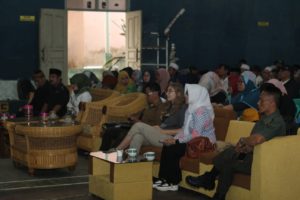
That said, there are other two assumptions to consider: 1) hunting is not so profitable in the area, and most of the hunters are hunting for hobby; 2) banning hunting activities in the area will bring to more profits for coffee farmers and their families since this is the main prerequisite missing to obtain the Wildlife-Friendly certification and thus to sell their coffee at higher prices. With more than 300 coffee farmers and their families involved in the wildlife-friendly coffee programme, having the hunting ban is by far the best scenario to increase the economy in the community considering the binary option. That is why the idea of a hunting ban started growing in the community.
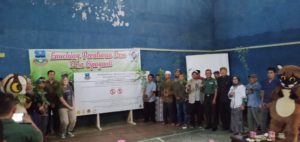
What we did to implement it and what we considered? The process of making the law was quite quick, and after a series of meetings, the first version of the law was in place. In early April, the major of Pangauban (village close to Cipaganti where some coffee farmers involved in the programme live, and where a similar law will be announced soon) provided us the first version of the law, shared then with the major of Cipaganti. In the law, the local government of Cipaganti and Pangauban also wanted to include other pro-environmental measures to preserve the environment and to ban littering. After some suggestions and the approval of LFP, the law has been discussed with the community. It took several months of discussion and socialisation to share the law with all the community and to have the approval of the committee. That was a very important part of the process since the community could have felt obliged without this socialisation, and it was important to have community approval before launching the law. Socialisation events have been held in each RW before the announcement, and the community approved the law. It is very important that the law emerged from a community will and it is not seen as an imposition by foreigners.
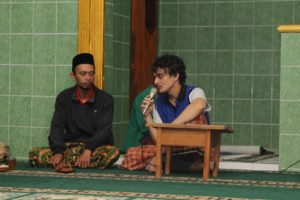
I have to note that the community has already a strong pro-environmental attitude emerged from our conservation efforts but also from cultural and religious beliefs. For example, every week they have an event at the mosque (where we also participated) discussing how to improve their environment and to protect nature, and this helped in creating the basis for this law. The main role of LFP in developing the law was to provide suggestions and motivate the community in the whole process so that they felt empowered to complete it. The mediation role of Gungun and Aconk and the direct involvement of coffee farmers (mainly the two roasters Pak Ajum and Pak Janjan) were key for this. We are now doing meetings with hunters and offering them alternatives to be involved in our project. We are also discussing with the local government to implement the littering ban and provide solutions (e.g. infrastructure, training) for waste management. And there is the potential to promote wildlife-friendly ecotourism in the area. Much more work is needed!
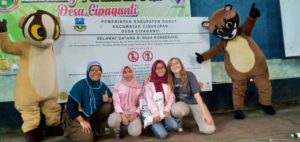
This was our present for slow lorises in 2019 and we all deserve to celebrate this, with the awareness that we will soon need to think about a perfect gift for 2020! MARCO CAMPERA

